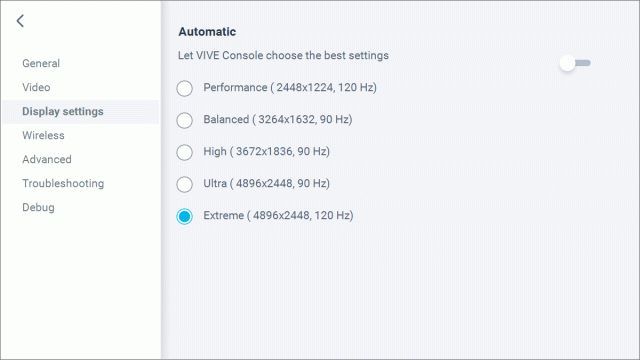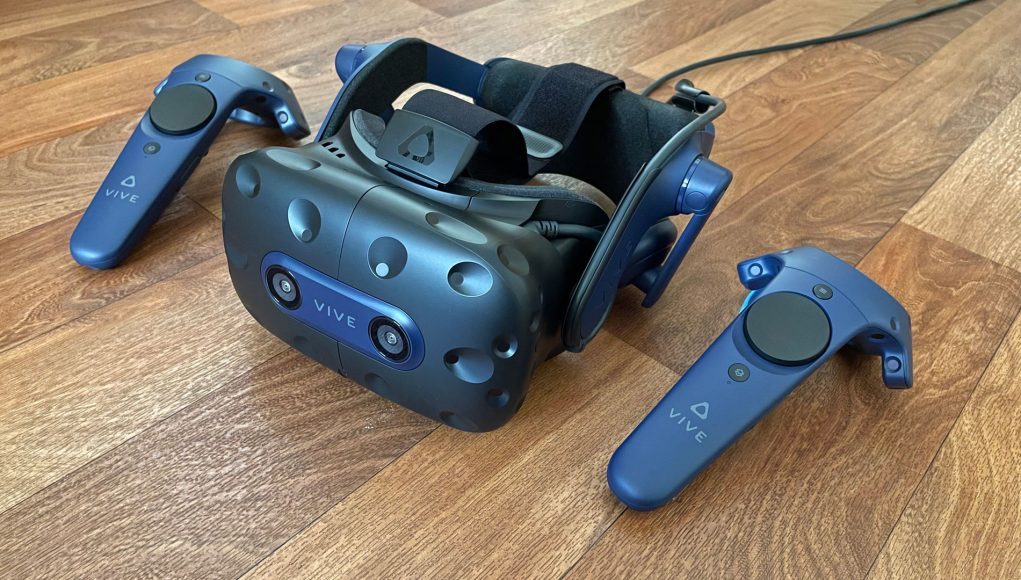Software Experience
 Vive Pro 2 works with SteamVR, but unlike HTC’s earlier headsets, it requires some additional companion software from HTC called the Vive Console which will be installed when you run through the setup process. This little app manages a few of the headset’s functions—most importantly the display resolution and framerate:
Vive Pro 2 works with SteamVR, but unlike HTC’s earlier headsets, it requires some additional companion software from HTC called the Vive Console which will be installed when you run through the setup process. This little app manages a few of the headset’s functions—most importantly the display resolution and framerate:  It isn’t clear exactly how the resolution options interact with SteamVR’s own Render Resolution setting, but in my testing the best practice seems to be to first max out the Vive Console resolution (if you can), and only then if your games continue to perform well should you consider raising the SteamVR Render Resolution setting above 100%. Interactions between the Vive Console and SteamVR can be a little awkward at times—SteamVR will sometimes crash when you’re trying to make changes that require restarting the Vive Console, and the Vive Console doesn’t seem to offer any automatic audio switching between the headset and back (normally this is handled by SteamVR, but Vive Pro 2 doesn’t seem to abide by those settings). Fortunately, HTC’s own Viveport app store is entirely optional to use, even if it installs itself automatically during the setup process. HTC has also built a handy little Viveport dashboard which allows you to view your Viveport apps right inside the SteamVR dashboard. While Steam is probably going to be the go-to store for most users, it’s worth giving the Viveport Infinity free trial a spin, which grants you access to a large catalog of VR games on a subscription basis. You won’t find nearly the same range of titles there as you would in Steam, but there’s some quality picks for sure.
It isn’t clear exactly how the resolution options interact with SteamVR’s own Render Resolution setting, but in my testing the best practice seems to be to first max out the Vive Console resolution (if you can), and only then if your games continue to perform well should you consider raising the SteamVR Render Resolution setting above 100%. Interactions between the Vive Console and SteamVR can be a little awkward at times—SteamVR will sometimes crash when you’re trying to make changes that require restarting the Vive Console, and the Vive Console doesn’t seem to offer any automatic audio switching between the headset and back (normally this is handled by SteamVR, but Vive Pro 2 doesn’t seem to abide by those settings). Fortunately, HTC’s own Viveport app store is entirely optional to use, even if it installs itself automatically during the setup process. HTC has also built a handy little Viveport dashboard which allows you to view your Viveport apps right inside the SteamVR dashboard. While Steam is probably going to be the go-to store for most users, it’s worth giving the Viveport Infinity free trial a spin, which grants you access to a large catalog of VR games on a subscription basis. You won’t find nearly the same range of titles there as you would in Steam, but there’s some quality picks for sure.
Disclosure: HTC provided Road to VR with a Vive Pro 2 headset.







